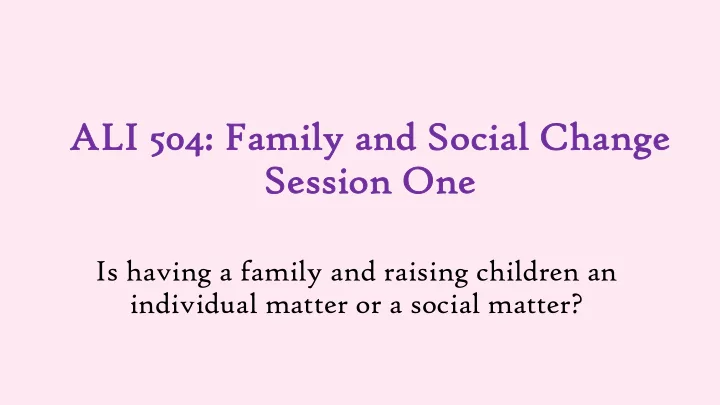

ALI 504: Family y and So Social Change Se Session One Is having a family and raising children an individual matter or a social matter?
O Prophet! When you divorce women, divorce them at the conclusion of their term and calculate the term and be wary of Allah, your Lord. Do not turn them out from their homes nor shall they go out unless they commit a gross indecency. These are Allah’s bounds and whoever transgresses the bounds of Allah certainly wrongs himself. You never know maybe Allah will bring off something new later on. Sur ura Ta Talaq, , no.6 .65, , verse 1
Then when they have completed their term either retain them honourably or separate from them honourably and take the witness of two honest men from among yourselves and bear witness for the sake of Allah. Whoever believes in Allah and the Last Day is advised to [comply with] this. Whoever is wary of Allah, He shall make for him a way out. Sur ura Ta Talaq, , no.6 .65, , verse 2
Ha Hadith There is nothing more disliked by Allah than a home which is ruined through separation [divorce] Ho Holy P y Prophet het ( (s) s), Was Wasil ilush Shia, , V.1 V.15 Marry and do not divorce for divorce shakes the throne of Alllah Ho Holy P y Prophet het ( (s) s), Was Wasil ilush Shia, , V.1 V.15
Cor Core func unctions ions of of the famil ily 1) Forming intimate partnerships and close relationships. 2) Maintaining households in which people share resources and support one another. 3) Raising the next generation of human beings.
Family relationships offer (or at least promise) opportunities for intimacy, warmth and interdependency rarely available in other relationships. According to a 1994 Angus Reid opinion poll, two- thirds of Canadians strongly agreed with the statement that their families are “the greatest joy in their lives
Equally compelling, family relationships can provoke feelings of loneliness, hostility, anger, jealousy and resentment. Much interpersonal violence occurs between family members (Statistics Canada 2005). When family relationships are dissatisfying or painful, the distress they cause is sharpened by what Bittman and Pixley refer to as the “endless inconsistencies between ‘the family’ that most people hope for and the family as they experience it”
No Norm rm in so society ty – pre e 195 1950 § Married couple start a family § Heterosexual couple § Clear roles of males and females § Close family relationships § Relatives considered to be part of family
Po Post 195 1950s f family § Couples living together § Women choosing to have children at a later age § Same sex partnerships § Women as bread winners § Rise of the nuclear family rather than the extended family § Separation and divorce is more common § Spousal violence is on the rise
Same Same se sex marri marriag age Prior to the 1970s, men’s homosexuality was a criminal offence in Canada. Those accused of homosexual activities were charged as sex offenders and, if convicted, could be sentenced to long prison terms. Gay activists and their supporters campaigned against such homophobic legislation and its related practices
Finally, in 1969, the federal Liberal government instituted sweeping reforms of Canada’s criminal law, which included decriminalizing homosexuality. In discussing the amendment, Pierre Trudeau, Justice Minister at the time, stressed the importance of individual freedom in the context of sexuality. Trudeau stated: “It’s bringing the laws of the land up to contemporary society I think. Take this thing on homosexuality. I think the view we take here is that there’s no place for the state in the bedrooms of the nation. I think that what’s done in private between adults doesn’t concern the Criminal Code.
Di Divorce In the early 20th century, Canada had one of the lowest divorce rates in the Euro-North American world. Divorce was uncommon until the late 1940s. It was legally difficult to get and widely condemned socially. Throughout the 20th century, divorce gradually became more acceptable so that in 1968 the first federal Divorce Act was passed. It retained fault- based grounds including adultery, cruelty and desertion, but also recognized the concept of permanent marriage breakdown and allowed both wives and husbands to sue.
Divorce became increasingly acceptable leading to the Divorce Act of 1985, which instituted major reforms. Subsequently, divorce has become easier to obtain legally and is increasingly socially acceptable. Numerous court cases have struggled with the most important legal issues in divorce, particularly the custody of children, the division of property and the question of whether to allocate responsibility for post- divorce financial support by one party for the other .
Pa Paren ents a and c chi hildren en Same-sex partnerships, adoptions and reproductive technologies have created new distinctions among parents and led to situations where sperm or ovum donors, the woman who carries the foetus to term, and infant care- providers may all be different, and unrelated people. These new possibilities have generated a range of legal and social questions about children’s rights to know their biological history, adults’ rights and responsibilities to their biological offspring, and the relative competing rights of biological and social parents.
How How it affec ects us Tension in the family – between spouses, parents and children, grand parents. Changing values – affects faith of children, family relationships, sense of identity
Up Upcomi ming ALI I clas asses AL ALI 481: Prepar eparin ing for Holy Ram amad adan an 1440 (for teen eenag age e boys) Instructors: Dr. Shabbir Alibhai, Dr. Mohammad Ali Shafiee & Sh. Hasanayn Kassamali Schedule: 2 Saturdays April 13 & April 27, 2019 from 7 – 8 pm AL ALI-505: 505: Jus ustice in Na Nahjul Ba Balagha Instructor: Sh. Hasanayn Kassamali Schedule: 2 Wednesdays, Apr 17 & 24, 2019, 8:30–10:00pm For details and to register visit www.academyofislam.com
Recommend
More recommend